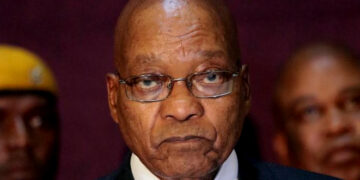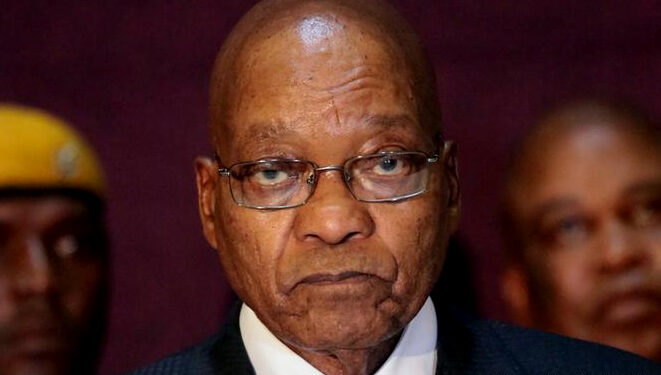By Lucy Adautin
On Friday, South Africa’s highest court convened to hear an appeal seeking to declare former president Jacob Zuma ineligible to stand for office, marking a pivotal moment in a politically charged legal confrontation poised to escalate tensions ahead of the nation’s most closely contested election in decades.
At 82 years old, Zuma is leading uMkhonto we Sizwe (MK), a new opposition party that has emerged as a potential disruptor in the forthcoming May 29 general election.
However, electoral authorities contend that the politician, tainted by corruption allegations, should be disqualified from the race due to a 2021 contempt of court conviction.
The Constitutional Court in Johannesburg has been tasked with rendering a decision on the matter following a lower court’s ruling in April, which favored Zuma’s position.
With the impending election anticipated to be the most fiercely contested since the dawn of democracy in 1994, the timing of this case has left many observers on edge.
The incarceration of Zuma in 2021 unleashed a wave of turmoil, resulting in widespread unrest, riots, and looting that claimed the lives of over 350 individuals.
In light of these past events, there is palpable apprehension about the potential for history to repeat itself, with fears lingering of a recurrence of violence and instability.
“Zuma’s supporters have threatened violence again this year should things not go their way,” said Zakhele Ndlovu, a politics lecturer at the University of KwaZulu-Natal.
A few dozen MK activists, wearing the party’s green and black colours, chanted and danced outside the court in a show of support for Zuma. Some held signs reading “Vote MK party”.
Inside, wearing a blue suit and tie, the spectacled politician sat behind his lawyers as they made their case.
Much of the morning was spent debating a request by Zuma’s legal team that six judges recuse themselves as “tainted by bias”.
The court eventually dismissed the application, providing no motivation. Many in the former president’s camp see the Constitutional Court as partisan.
It is the same court that in 2021 sentenced Zuma to 15 months in prison after he refused to testify to a panel investigating financial corruption and cronyism during his presidency. And the head of that panel is now the court’s chief justice.
The case revolves around the interpretation of a constitutional norm barring anyone sentenced to more than 12 months’ imprisonment from serving in parliament.
The ban lapses five years after the sentence is completed. The electoral commission (IEC) argued the provision applies to Zuma.
But the political veteran’s lawyers successfully contended before the electoral court that it does not, for his sentence did not allow for an appeal and was shortened by a remission.
Legal experts said it might take a few days to reach a final verdict.
Ben Winks, a lawyer specialising in constitutional law said the IEC had a strong case on appeal.
“The wording of the constitution… does not talk about how long you served,” he noted.
Zuma’s swift release on medical parole just two months into his prison term has dramatically altered the political landscape. His newly formed party, MK, has surged unexpectedly to become one of the primary contenders in the upcoming election.
Capitalizing on Zuma’s enduring popularity, MK is poised to chip away at the vote share of the embattled ruling African National Congress (ANC), the political stronghold once shared by the former president.
This shift in electoral dynamics could potentially push the ANC below the critical 50 percent threshold for the first time in a national vote, leaving it without a parliamentary majority and necessitating the pursuit of coalition partnerships to retain power.
The ANC’s fortunes have been waning in opinion polls amid economic fragility and mounting allegations of corruption and mismanagement. According to an Ipsos poll released last month, the ANC garnered 40.2 percent support, with the liberal Democratic Alliance at 21.9 percent and the leftist Economic Freedom Fighters at 11.5 percent. MK followed closely at 8.4 percent.
Amidst this charged political environment, the Independent Electoral Commission (IEC) announced its intention to launch an appeal seeking clarity on Zuma’s candidacy status, emphasizing its commitment to ensuring free and fair elections while refraining from political interference.
As South Africa braces for a pivotal electoral moment, citizens are called upon to cast their votes to elect a new parliament, which will subsequently appoint the nation’s next president.

































